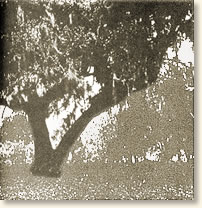|
President Lincoln Signs
the Emancipation Proclamation, 1863
"If slavery is not wrong, nothing is wrong." This is what Abraham Lincoln stated in a letter to a constituent in 1864. He had always been against slavery but believed that his presidential powers as defined by the Constitution did not give him the authority to abolish it. In early 1862, Lincoln tried and failed to develop an alternative approach: an effort to free the salves of the Border States by buying out their masters.
 |
The "Emancipation Oak"in
Beaufort, SC. The Proclamation
was first read to slaves here.
The spot became hallowed ground. |
Stymied, Lincoln came up with a unique solution; if he could not eliminate slavery in the Union, he would do it in the Confederacy. He would abolish slavery in the Southern States based on his military powers as commander-in-chief of the Union's war effort. His decision was prompted by the realization that slave labor provided the foundation of the South's ability to wage war. On the battle front, slaves dug the trenches, built the battlements, cooked the meals and drove the wagons. On the home front, they tilled the fields, ginned the cotton, and performed many other duties that underpinned the South's economy. Slave labor freed the Confederate soldiers for combat. Without their slaves, the South's military power would be seriously diminished. Thus, his proclamation to end slavery in the South would be a military action intended to further the Union's war effort for, as Lincoln declared: "civilized belligerents do all in their power to help themselves or hurt the enemy."
He revealed his plan and a first draft of the proclamation to his Cabinet on July 22, 1862. He made it clear that he was not seeking their approval, as he had made up his mind to issue the proclamation. He did, however, ask for their comments. Secretary of State Seward questioned the timing of the announcement. The war was not going well for the North. A year earlier it had been soundly defeated at the First Battle of Bull Run and subsequent attempts to attack the South had sputtered. Seward felt that announcing the proclamation at this time would appear to be a desperate attempt of a broken government to rally opinion at home and abroad to its cause. Better to wait for a victory on the battlefield. Lincoln agreed.
The Union's victory came in September when it repulsed Lee's invasion of the North at the Battle of Antietam (see Carnage at Antietam, 1862). Lincoln issued a preliminary draft of the proclamation on September 22 that warned the Confederate States that if they did not return to the Union by January 1, 1863, he would issue a second proclamation declaring the slaves of those states "forever free". His warning was ignored. The general reaction in the North was supportive, but many had doubts as to whether Lincoln would actually follow through with his plan.
John Nicolay and John Hay were Lincoln's private secretaries and were there on that New Years' Day when he signed the Emancipation Proclamation:
"Mr. Lincoln took the various manuscript notes and memoranda which his Cabinet advisers brought him on the 31st of December and during that afternoon and the following morning with his own hand carefully rewrote the entire body of the draft of the proclamation...
It is a custom in the Executive Mansion to hold on New Year's Day an official and public reception, beginning at eleven o'clock in the morning, which keeps the President at his post in the Blue Room until two in the afternoon. The hour for this reception came before Mr. Lincoln had entirely finished revising the engrossed copy of the proclamation, and he was compelled to hurry away from his office to friendly handshaking and festal greeting with the rapidly arriving official and diplomatic guests.
The rigid laws of etiquette held him to this duty for the space of three hours. Had actual necessity required it, he could of course have left such mere social occupation at any moment; but the President saw no occasion for precipitancy. On the other hand, he probably deemed it wise that the completion of this momentous executive act should be attended by every circumstance of deliberation.
Vast as were its consequences, the act itself was only the simplest and briefest formality. It could in no wise be made sensational or dramatic. Those characteristics attached, if at all, only to the long-past decisions and announcements of July 22 and September 22 of the previous year. Those dates had witnessed the mental conflict and the moral victory.
No ceremony was made or attempted of this final official signing. The afternoon was well advanced when Mr. Lincoln went back from his New Year's greetings, with his right hand so fatigued that it was an effort to hold the pen. There was no special convocation of the Cabinet or of prominent officials. Those who were in the house came to the executive office merely from the personal impulse of curiosity joined to momentary convenience.
His signature was attached to one of the greatest and most beneficent military decrees of history in the presence of less than a dozen persons; after which it was carried to the Department of State to be attested by the great seal and deposited among the archives of the Government."
References:
This eyewitness account appears in: Nicolay. John G. and John Hay, Abraham Lincoln, a History vol. 6 (1890); Goodwin, Doris Kearns, Team of Rivals (2005).
How To Cite This Article:
"President Lincoln Signs the Emancipation Proclamation, 1863" EyeWitness to History, www.eyewitnesstohistory.com (2006).
| 





